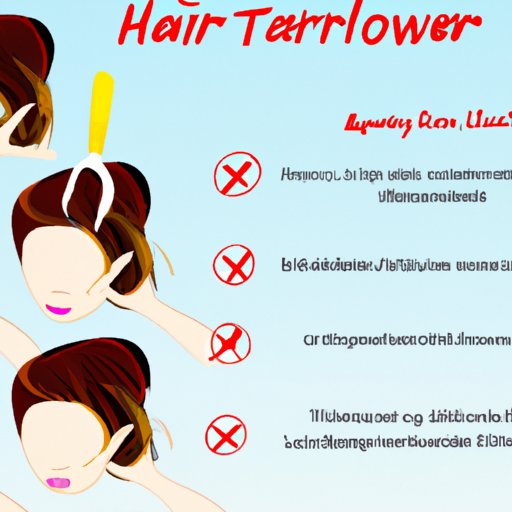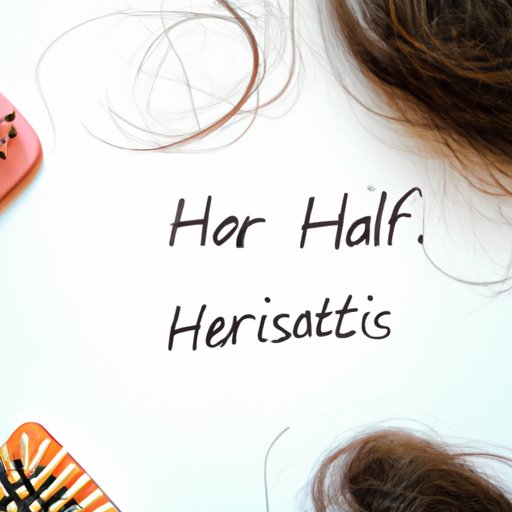Introduction
Hair loss is a common problem that affects both men and women. It can be caused by various factors, such as genetics and hormones, medications, poor nutrition, and stress. In this article, we will explore the causes of excessive hair loss and strategies for preventing it, including dietary and lifestyle factors, natural remedies, and managing stress.
Causes of Excessive Hair Loss: An Overview
Hair loss can be caused by many different factors. Some of the most common causes include genetics and hormones, medications, poor nutrition, and stress.
Genetics and hormones
Genetics and hormones play an important role in determining whether or not someone will experience hair loss. For example, androgenic alopecia, commonly known as male pattern baldness, is caused by a combination of genetic and hormonal factors. Women can also experience hair loss due to hormonal changes associated with menopause.
Medications
Certain medications can cause hair loss as a side effect. These medications include chemotherapy drugs, blood thinners, beta-blockers, antidepressants, and non-steroidal anti-inflammatory drugs (NSAIDs). If you are taking any of these medications and experiencing hair loss, talk to your doctor about alternative treatments.
Poor nutrition
A lack of essential nutrients, such as vitamins and minerals, can lead to hair loss. Eating a balanced diet and taking a daily multivitamin can help ensure that your body is getting the proper nutrition it needs to promote healthy hair growth.
Stress
Stress can have a major impact on the health of your hair. When you are under a lot of stress, your body produces the hormone cortisol, which can interfere with the production of healthy hair follicles. Additionally, stress can lead to unhealthy habits, such as poor diet and lack of exercise, which can further contribute to hair loss.

Strategies for Preventing Unwanted Hair Loss
Fortunately, there are several strategies that can help prevent unwanted hair loss. These strategies include maintaining a healthy diet, avoiding harsh styling products, reducing stress, and using natural remedies.
Maintain a healthy diet
Eating a healthy, balanced diet is essential for promoting healthy hair growth. Make sure to include plenty of fresh fruits and vegetables, lean proteins, whole grains, and healthy fats in your diet. Additionally, taking a daily multivitamin can help ensure that your body is getting the essential vitamins and minerals it needs for healthy hair growth.
Avoid harsh styling products
Harsh styling products, such as dyes, bleaches, and perms, can damage the hair follicles and lead to hair loss. If you must use these products, try to limit their use and opt for gentler alternatives whenever possible.
Reduce stress
Reducing stress is an important part of preventing hair loss. There are many ways to reduce stress, such as exercising, meditating, spending time in nature, and talking to friends and family. Additionally, finding healthy ways to cope with stress, such as journaling and yoga, can help reduce levels of cortisol in the body and promote healthy hair growth.
Use natural remedies
There are many natural remedies that can help promote healthy hair growth. Essential oils, such as lavender and rosemary, have been found to be effective in treating hair loss. Herbal teas, such as green tea and chamomile, can also help strengthen the hair follicles. Additionally, taking vitamins and supplements, such as biotin and zinc, can help supply the body with the essential nutrients it needs for healthy hair growth.
Diet and Lifestyle Factors that Contribute to Hair Loss
In addition to the causes mentioned above, certain dietary and lifestyle factors can contribute to hair loss. Vitamin deficiencies, smoking, alcohol consumption, and lack of exercise can all lead to hair loss.
Vitamin deficiencies
Vitamin deficiencies, such as a lack of vitamin B12, can lead to hair loss. Eating a balanced diet and taking a daily multivitamin can help ensure that your body is getting the proper nutrition it needs for healthy hair growth.
Smoking
Smoking has been linked to hair loss in both men and women. Quitting smoking can help improve the health of your hair and reduce the risk of hair loss.
Alcohol consumption
Excessive alcohol consumption can lead to hair loss. Limiting alcohol intake can help reduce the risk of hair loss.
Lack of exercise
Lack of exercise can lead to poor circulation, which can result in hair loss. Getting regular physical activity can help improve circulation and promote healthy hair growth.

Natural Remedies to Combat Hair Loss
In addition to eating a healthy diet and avoiding lifestyle factors that can contribute to hair loss, there are several natural remedies that can help combat hair loss. Essential oils, herbal teas, and vitamins and supplements can all help promote healthy hair growth.
Essential oils
Essential oils, such as lavender and rosemary, have been found to be effective in treating hair loss. Massaging the scalp with a few drops of these essential oils can help stimulate the hair follicles and promote healthy hair growth.
Herbal teas
Herbal teas, such as green tea and chamomile, can help strengthen the hair follicles and reduce the risk of hair loss. Drinking 1-2 cups of these teas each day can help promote healthy hair growth.
Vitamins and supplements
Taking vitamins and supplements, such as biotin and zinc, can help supply the body with the essential nutrients it needs for healthy hair growth. Additionally, these vitamins and supplements can help reduce inflammation, which can further help promote healthy hair growth.

Understanding the Link Between Stress and Hair Loss
Stress can have a major impact on the health of your hair. When you are under a lot of stress, your body produces the hormone cortisol, which can interfere with the production of healthy hair follicles. Additionally, stress can lead to unhealthy habits, such as poor diet and lack of exercise, which can further contribute to hair loss.
Physical effects of stress on the body
When you are under a lot of stress, your body releases stress hormones, such as cortisol and adrenaline. These hormones can interfere with the production of healthy hair follicles, leading to hair loss.
Psychological impact of stress
The psychological effects of stress can also lead to hair loss. Stress can cause anxiety and depression, which can lead to unhealthy habits, such as poor diet and lack of exercise. These unhealthy habits can further contribute to hair loss.
Tips for managing stress
Finding healthy ways to cope with stress, such as journaling and yoga, can help reduce levels of cortisol in the body and promote healthy hair growth. Additionally, talking to friends and family, spending time in nature, and exercising can all help reduce stress and promote healthy hair growth.
Conclusion
In conclusion, hair loss can be caused by many different factors, such as genetics and hormones, medications, poor nutrition, and stress. Fortunately, there are several strategies that can help prevent unwanted hair loss, such as maintaining a healthy diet, avoiding harsh styling products, reducing stress, and using natural remedies. Additionally, understanding the link between stress and hair loss can help you find healthy ways to manage stress and promote healthy hair growth.


